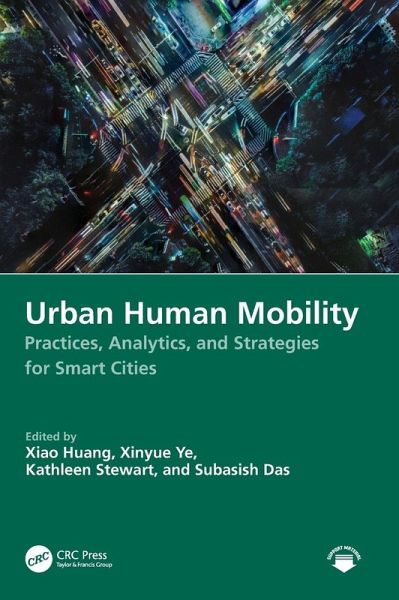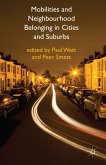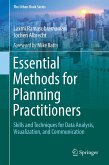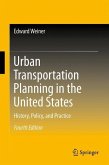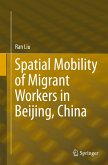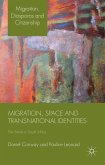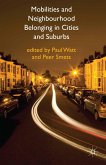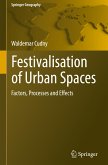Urban Human Mobility
Practices, Analytics, and Strategies for Smart Cities
Herausgeber: Stewart, Kathleen; Ye, Xinyue; Huang, Xiao; Das, Subasish
Urban Human Mobility
Practices, Analytics, and Strategies for Smart Cities
Herausgeber: Stewart, Kathleen; Ye, Xinyue; Huang, Xiao; Das, Subasish
- Gebundenes Buch
- Merkliste
- Auf die Merkliste
- Bewerten Bewerten
- Teilen
- Produkt teilen
- Produkterinnerung
- Produkterinnerung
This comprehensive handbook covers human mobility within urban contexts, integrating academic theories with pragmatic insights offering a detailed analysis of the diverse facets of human mobility and its substantial impact on the urban landscape, economy, and societal structures.
Andere Kunden interessierten sich auch für
![Mobilities and Neighbourhood Belonging in Cities and Suburbs Mobilities and Neighbourhood Belonging in Cities and Suburbs]() Mobilities and Neighbourhood Belonging in Cities and Suburbs39,99 €
Mobilities and Neighbourhood Belonging in Cities and Suburbs39,99 €![Essential Methods for Planning Practitioners Essential Methods for Planning Practitioners]() Laxmi RamasubramanianEssential Methods for Planning Practitioners93,99 €
Laxmi RamasubramanianEssential Methods for Planning Practitioners93,99 €![Urban Transportation Planning in the United States Urban Transportation Planning in the United States]() Edward WeinerUrban Transportation Planning in the United States116,99 €
Edward WeinerUrban Transportation Planning in the United States116,99 €![Spatial Mobility of Migrant Workers in Beijing, China Spatial Mobility of Migrant Workers in Beijing, China]() Ran LiuSpatial Mobility of Migrant Workers in Beijing, China77,99 €
Ran LiuSpatial Mobility of Migrant Workers in Beijing, China77,99 €![Migration, Space and Transnational Identities Migration, Space and Transnational Identities]() D. ConwayMigration, Space and Transnational Identities39,99 €
D. ConwayMigration, Space and Transnational Identities39,99 €![Mobilities and Neighbourhood Belonging in Cities and Suburbs Mobilities and Neighbourhood Belonging in Cities and Suburbs]() Mobilities and Neighbourhood Belonging in Cities and Suburbs39,99 €
Mobilities and Neighbourhood Belonging in Cities and Suburbs39,99 €![Festivalisation of Urban Spaces Festivalisation of Urban Spaces]() Waldemar CudnyFestivalisation of Urban Spaces77,99 €
Waldemar CudnyFestivalisation of Urban Spaces77,99 €-
-
-
This comprehensive handbook covers human mobility within urban contexts, integrating academic theories with pragmatic insights offering a detailed analysis of the diverse facets of human mobility and its substantial impact on the urban landscape, economy, and societal structures.
Hinweis: Dieser Artikel kann nur an eine deutsche Lieferadresse ausgeliefert werden.
Hinweis: Dieser Artikel kann nur an eine deutsche Lieferadresse ausgeliefert werden.
Produktdetails
- Produktdetails
- Verlag: Taylor & Francis Ltd
- Seitenzahl: 384
- Erscheinungstermin: 24. Juni 2025
- Englisch
- Abmessung: 254mm x 178mm
- ISBN-13: 9781032821627
- ISBN-10: 1032821620
- Artikelnr.: 72738062
- Herstellerkennzeichnung
- Libri GmbH
- Europaallee 1
- 36244 Bad Hersfeld
- gpsr@libri.de
- Verlag: Taylor & Francis Ltd
- Seitenzahl: 384
- Erscheinungstermin: 24. Juni 2025
- Englisch
- Abmessung: 254mm x 178mm
- ISBN-13: 9781032821627
- ISBN-10: 1032821620
- Artikelnr.: 72738062
- Herstellerkennzeichnung
- Libri GmbH
- Europaallee 1
- 36244 Bad Hersfeld
- gpsr@libri.de
Dr. Xiao Huang is an Assistant Professor in the Department of Environmental Sciences at Emory University. His research focuses on geospatial analysis, urban informatics, human mobility, and big data analytics. He has authored/co-authored more than 200 peer-reviewed publications. Professionally, he sits on the Editorial Board for eight journals. His research has been funded by various agencies, including NSF, NASA, the Bill & Melinda Gates Foundation, and the National Academies, to list a few. Dr. Xinyue Ye is the Harold Adams Endowed Professor in Urban Planning and Stellar Faculty Provost Target Hire at Texas A&M University (TAMU). He serves as the Faculty Fellow for The Division of Research at TAMU. His research integrates computational social science, urban data science, and geospatial artificial intelligence to address issues ranging from infrastructure resilience and climate change to social justice and community perceptions, underscoring the dynamic interplay between technology, policy, and human behavior in shaping sustainable and livable cities. He is Fellow of both the American Association of Geographers and the Royal Geographical Society. Dr. Kathleen Stewart is Professor in the Department of Geographical Sciences at the University of Maryland and Director of the Center for Geospatial Information Science. She works in the area of geographic information science with a particular focus on geospatial dynamics. Dr. Stewart serves as a member of the National Geospatial Advisory Committee. She is a Fellow of the University Consortium of Geographic Information Science , and a member of the editorial boards of The International Journal of Geographical Information Science, Geographical Analysis, the Journal of Spatial Information Science, the International Journal of Geo-Information and Geomatics among others. Dr. Subasish Das is an Assistant Professor of Civil Engineering Program in the Ingram School of Engineering at Texas State University. He has more than 13 years of experience related to roadway safety, traffic operation, and connected and automated vehicle technologies. His major areas of expertise include database management, statistical analysis and machine learning with emphasis in safety and transportation operations, spatial analysis with modern web GIS tools, interactive data visualization, and deep learning tools for CAV technologies. He has published more than 160 technical reports, and journal articles.
The Pillars of Modern Urban Human Mobility Studies. 3. Equity and
Accessibility in Urban Mobility. 4. Social and Cultural Dimensions of Urban
Human Mobility. 5. Natural Disasters and Urban Human Mobility. 6. Economics
of Urban Mobility. 7. Data Governance Policies for Human-centric Urban
Mobility Services in Smart Cities. 8. Urban Human Mobility and Energy.
Section III: Technologies and Techniques Shaping Urban Human Mobility
Studies. 9. Prediction and Analysis of Urban Mobility based on Attention
Mechanism and Geographic Information Embedding. 10. Human Mobility
Clustering Analysis: A Case Study of Ride-hailing Demand Analysis. 11.
GenAI-powered Multi-Agent Paradigm for Smart Urban Mobility: Opportunities
and Challenges for Integrating Large Language Models (LLMs) and
Retrieval-Augmented Generation (RAG) with Intelligent Transportation
Systems. 12. Agent-based Modeling and Simulation for Smart Cities. 13.
Trajectory Privacy Protection Approaches. 14. Deep Learning-Based Modeling
of Human Trajectory Uncertainty in Urban Environments. 15. Towards the
Spatial Evolution between Distribution Snapshots: A Network Perspective.
16. Human Mobility and Public Health. 17. The Challenges and Future
Research for Human Mobilities in Nature Disasters. 18. From Vulnerability
to Resilience: Rethinking Urban Transportation in a Changing Climate. 19.
Human Mobility in the Post-Pandemic World. 20. The Influence of the
COVID-19 Pandemic on Human Daily Mobility and Time Allocation. 21.
Sustainability Implications of Digital Twins for Urban Mobility. 22. From
Human Mobility to Social Segregation: What Insights Can Social Media Data
Provide?. 23. Measuring Public Transit Resilience with High-resolution
Real-time Geospatial Data. 24. Individual Environmental Exposure Dynamics
Through the Lens of Neighborhood Effect Averaging. 25. Bike-sharing:
Towards Equitable Urban Transportation. 26. Ridesourcing: A Game-Changer
for Urban Mobility. 27. A Comparative Analysis of Governance of Urban
Public Transport in Asian Cities. 28. The Future of Urban Human Mobility
Studies.
Accessibility in Urban Mobility. 4. Social and Cultural Dimensions of Urban
Human Mobility. 5. Natural Disasters and Urban Human Mobility. 6. Economics
of Urban Mobility. 7. Data Governance Policies for Human-centric Urban
Mobility Services in Smart Cities. 8. Urban Human Mobility and Energy.
Section III: Technologies and Techniques Shaping Urban Human Mobility
Studies. 9. Prediction and Analysis of Urban Mobility based on Attention
Mechanism and Geographic Information Embedding. 10. Human Mobility
Clustering Analysis: A Case Study of Ride-hailing Demand Analysis. 11.
GenAI-powered Multi-Agent Paradigm for Smart Urban Mobility: Opportunities
and Challenges for Integrating Large Language Models (LLMs) and
Retrieval-Augmented Generation (RAG) with Intelligent Transportation
Systems. 12. Agent-based Modeling and Simulation for Smart Cities. 13.
Trajectory Privacy Protection Approaches. 14. Deep Learning-Based Modeling
of Human Trajectory Uncertainty in Urban Environments. 15. Towards the
Spatial Evolution between Distribution Snapshots: A Network Perspective.
16. Human Mobility and Public Health. 17. The Challenges and Future
Research for Human Mobilities in Nature Disasters. 18. From Vulnerability
to Resilience: Rethinking Urban Transportation in a Changing Climate. 19.
Human Mobility in the Post-Pandemic World. 20. The Influence of the
COVID-19 Pandemic on Human Daily Mobility and Time Allocation. 21.
Sustainability Implications of Digital Twins for Urban Mobility. 22. From
Human Mobility to Social Segregation: What Insights Can Social Media Data
Provide?. 23. Measuring Public Transit Resilience with High-resolution
Real-time Geospatial Data. 24. Individual Environmental Exposure Dynamics
Through the Lens of Neighborhood Effect Averaging. 25. Bike-sharing:
Towards Equitable Urban Transportation. 26. Ridesourcing: A Game-Changer
for Urban Mobility. 27. A Comparative Analysis of Governance of Urban
Public Transport in Asian Cities. 28. The Future of Urban Human Mobility
Studies.
The Pillars of Modern Urban Human Mobility Studies. 3. Equity and
Accessibility in Urban Mobility. 4. Social and Cultural Dimensions of Urban
Human Mobility. 5. Natural Disasters and Urban Human Mobility. 6. Economics
of Urban Mobility. 7. Data Governance Policies for Human-centric Urban
Mobility Services in Smart Cities. 8. Urban Human Mobility and Energy.
Section III: Technologies and Techniques Shaping Urban Human Mobility
Studies. 9. Prediction and Analysis of Urban Mobility based on Attention
Mechanism and Geographic Information Embedding. 10. Human Mobility
Clustering Analysis: A Case Study of Ride-hailing Demand Analysis. 11.
GenAI-powered Multi-Agent Paradigm for Smart Urban Mobility: Opportunities
and Challenges for Integrating Large Language Models (LLMs) and
Retrieval-Augmented Generation (RAG) with Intelligent Transportation
Systems. 12. Agent-based Modeling and Simulation for Smart Cities. 13.
Trajectory Privacy Protection Approaches. 14. Deep Learning-Based Modeling
of Human Trajectory Uncertainty in Urban Environments. 15. Towards the
Spatial Evolution between Distribution Snapshots: A Network Perspective.
16. Human Mobility and Public Health. 17. The Challenges and Future
Research for Human Mobilities in Nature Disasters. 18. From Vulnerability
to Resilience: Rethinking Urban Transportation in a Changing Climate. 19.
Human Mobility in the Post-Pandemic World. 20. The Influence of the
COVID-19 Pandemic on Human Daily Mobility and Time Allocation. 21.
Sustainability Implications of Digital Twins for Urban Mobility. 22. From
Human Mobility to Social Segregation: What Insights Can Social Media Data
Provide?. 23. Measuring Public Transit Resilience with High-resolution
Real-time Geospatial Data. 24. Individual Environmental Exposure Dynamics
Through the Lens of Neighborhood Effect Averaging. 25. Bike-sharing:
Towards Equitable Urban Transportation. 26. Ridesourcing: A Game-Changer
for Urban Mobility. 27. A Comparative Analysis of Governance of Urban
Public Transport in Asian Cities. 28. The Future of Urban Human Mobility
Studies.
Accessibility in Urban Mobility. 4. Social and Cultural Dimensions of Urban
Human Mobility. 5. Natural Disasters and Urban Human Mobility. 6. Economics
of Urban Mobility. 7. Data Governance Policies for Human-centric Urban
Mobility Services in Smart Cities. 8. Urban Human Mobility and Energy.
Section III: Technologies and Techniques Shaping Urban Human Mobility
Studies. 9. Prediction and Analysis of Urban Mobility based on Attention
Mechanism and Geographic Information Embedding. 10. Human Mobility
Clustering Analysis: A Case Study of Ride-hailing Demand Analysis. 11.
GenAI-powered Multi-Agent Paradigm for Smart Urban Mobility: Opportunities
and Challenges for Integrating Large Language Models (LLMs) and
Retrieval-Augmented Generation (RAG) with Intelligent Transportation
Systems. 12. Agent-based Modeling and Simulation for Smart Cities. 13.
Trajectory Privacy Protection Approaches. 14. Deep Learning-Based Modeling
of Human Trajectory Uncertainty in Urban Environments. 15. Towards the
Spatial Evolution between Distribution Snapshots: A Network Perspective.
16. Human Mobility and Public Health. 17. The Challenges and Future
Research for Human Mobilities in Nature Disasters. 18. From Vulnerability
to Resilience: Rethinking Urban Transportation in a Changing Climate. 19.
Human Mobility in the Post-Pandemic World. 20. The Influence of the
COVID-19 Pandemic on Human Daily Mobility and Time Allocation. 21.
Sustainability Implications of Digital Twins for Urban Mobility. 22. From
Human Mobility to Social Segregation: What Insights Can Social Media Data
Provide?. 23. Measuring Public Transit Resilience with High-resolution
Real-time Geospatial Data. 24. Individual Environmental Exposure Dynamics
Through the Lens of Neighborhood Effect Averaging. 25. Bike-sharing:
Towards Equitable Urban Transportation. 26. Ridesourcing: A Game-Changer
for Urban Mobility. 27. A Comparative Analysis of Governance of Urban
Public Transport in Asian Cities. 28. The Future of Urban Human Mobility
Studies.

